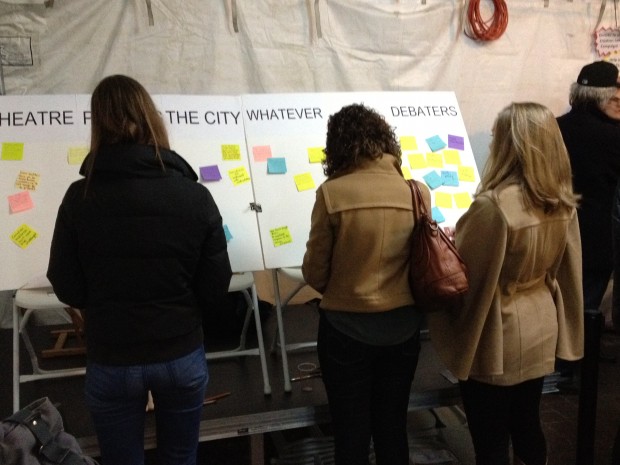Civil Debates: Resolutions Selected
After receiving over 100 suggestions for debate topics as well as a slew of suggestions for debaters through our interactive installation at The Next Stage Festival, Praxis Theatre and The Theatre Centre have distilled three resolutions to be tackled at the first three Civil Debates.
Each of these topics were suggested multiple times through the installation, have already received significant online debate, and have the potential to create reasonable arguments for and against the resolution:
March 7, 2013
March 15, 2013
#1: Creative Cities
Be it resolved that the Creative Cities theories serve to reinforce dominant class structures.
April 4, 2013
April 1, 2013
#2: Arts Boards
Be it resolved that Boards of Directors have the right and responsibility to overrule the Artistic Direction of a theatre company.
May 2, 2013
Date TBD
#3: Idle No More
Be it resolved that the issues that created the Idle No More movement require extreme methods to achieve change.
— a formal discussion on a particular matter in a public meeting or legislative assembly, in which opposing arguments are put forward and which usually ends with a vote.
ci·vil, adj. /ˈsɪv(ə)l, -ɪl/
— relating to ordinary citizens and their concerns.
— courteous and polite.
Oxford Dictionary
Civil Debates will take place on the first Thursday of each month, starting March 7th at The Theatre Centre Pop-Up. The speakers for each debate will be announced in advance on praxistheatre.com and theatrecentre.org. If you would like to debate a particular topic, email info@praxistheatre.com with why in less than 100 words. If selected, debaters are paid a $50 honorarium.
Live tweetcasts will be available for each debate, along with blog posts and social media sharing to facilitate further discussion. Civil Debates use the Canadian parliamentary debate model: 2 speakers on each side, strict time allotments, moderated exchange and conclude with a vote Yay or Nay. Audience members will be given the opportunity to participate, but it is not required
Praxis Theatre and The Theatre Centre present
CIVIL DEBATES
First Thursday of the month: March 7, April 4, May 2, 2013. Doors at 7pm; debates at 7.30pm
The Theatre Centre Pop-Up, 1095 Queen St. West
Admission: PWYC





You say:|
“#2: Arts Boards
Be it resolved that Boards of Directors have the right and responsibility to overrule the Artistic Direction of a theatre company.”
I say:
This question is a bit blurry around the edges. As it no doubt came about because of the Factory episode I would suggest that the legal rules determining the role of boards are vastly different for charitable and non charitable organizations. The CRA does not differentiate if a charity is a theatre or not and thus the rules for all charities are the same. Your question could easily be: Does a Board of Directors of a charitable organization have the right to over rule the Executive Director.
I am, of course, just talking from a legal perspective which is why I suggest that the question is a bit too vague and could end up comparing apples and pomelos.
Philip
Further, at the risk of boring people to death, I offer: http://www.carters.ca/pub/article/charity/2011/tsc0329.pdf
Particularly good stuff on pages 11, 12 and 19.
Philip
Hi Philip,
Thanks for your comment. I’m glad the debate begins already.
Sure, the Factory situation was part of what motivated people to suggest this topic – but I think we have seen other boards of other companies also exercising their (perceived?) authority, and so we thought it would be a good idea to have a discussion surrounding these issues.
You have no idea how long we debated the wording of this question, and let me tell you, there is not phrasing that will keep everyone happy. What we’re looking for with the resolution was a way to split the debate down the middle to two positions that can reasonably be taken. So it might be fuzzy, but hopefully it is inclusive.
I found 2 interesting tidbits from the document you linked to:
So we can assume what responsibilities Boards have is sketchy to begin with. This is not a black and white question.
Really? Boards of Directors are supposed to be the “public face of the corporation”? I thought that was the Artistic Director’s job? If these are the guidelines boards are following, maybe they need to be adjusted.
So that in a nutshell is why the resolution is phrased that way – to leave room for the possibility, separate from whatever the technical rules about this might be – that practically they COULD be wrong or out of date.
Next question: Would you like to be a debater?
Cheers,
Michael